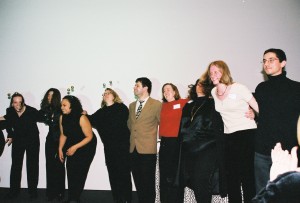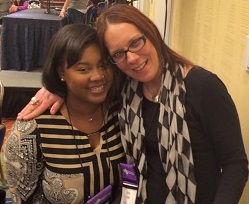As our department and numerous others think about ways to increase majors, I left our last faculty meeting thinking “Why Sociology?”. Not just for students, but why we – as faculty – studied, are teaching, or are using sociology in our research or work. I thought about not only personal statements I had to write for the job market, discussing my parent’s influence on my sociological perspective, but also jobs (pre- and post-PhD), volunteer experiences, and in general, my life in terms of why sociology or how I use sociology and continue to learn.
One can read numerous reports by the American Sociological Association on why students major in sociology and their paths after graduation . Most do not go on the “sociological academic” track (i.e. PhD programs in Sociology), but instead if they go to graduate school, they do so in more applied fields such as social work, public health, or the law. Sociology majors with various degrees, from the Bachelors, Masters, to the PhD, also work in a variety of settings. So, why sociology for a major? The skills? The mindset? What can entice students towards this major and what are the “benefits”? I believe if we cannot explain our own sociological perspective and mindset, including the utility to everyday life and careers beyond academia, we may be limiting sociology as a potential major or way of thinking for students. In today’s post, I’ll relate how I “came” to sociology.
My Background: A Sociology Major from the Beginning
I grew up in a family that fostered my educational aspirations by providing the access and financial means to do so. Despite these normative privileges afforded to me, my parents taught me important lesions about society and inequality that has impacted my personal values, work, and scholarship.

Growing up in the Midwest, I watched my parents actively participate in the Elks Club, in which service to others was a defining element of this benevolent organization. Each Holiday season, I helped assemble and deliver food baskets to economically disadvantaged families with my parents. I remember one year when we met a family who could not afford to turn on their heat. The whole family sat in front of the open stove in the kitchen for warmth. When I asked my parents about this, they explained to me the existence of poverty and inequality in our society. This small incident began what has become my lifelong exploration of and work toward ending social injustice. I was shown through example by my parents that social justice was something to strive for and that that our own comfortable middle class status was indeed a privilege.
My childhood and adolescence were also shaped by my mother’s job working as a claims’ administrator at the Social Security Administration (SSA). In an emotionally challenging job, my mother worked with a variety of people, from those with disabilities to those with economic difficulties, who were usually on the lower rung of the social class and status ladder in society. My mother’s duties included determining whether they qualified for Social Security, and the amount of benefits the government would provide. During high school, my mother took an early retirement from SSA. We discussed her job at length and the reasons why she was retiring at younger age, as she articulated a description of structural inequalities in society. My mom existed as the middle person between those in need and the government, and she found the rules and bureaucracy limiting. Emotional strain resulted when she had to work with those in need who did not receive what they needed to survive. This profound sociological insight has had a lasting impact on my views of structural inequality.

Coming from a background where service to others was important, at the end of high school and in college, I started working with people with disabilities. My work included program development, life skills training, and community integration. Doing this work, I not only witnessed, first- hand, the discrimination that persons with disabilities face, but also learned life lessons from my clients. They taught me about friendship, understanding, and the importance of appreciating the simple things in life in a society that promotes perfectionism, able-ism, and cultural consumerism to make us happy. This job has had a significant influenced on my life. They were a part of my family. Starting this work while I was in high school, while also taking a sociology class, combined with the influence of my background and influenced my decision to declare sociology as a major in college. I knew that I wanted to make a difference. Working with people with disabilities allowed me to see how society is structured in a way that creates and constructs differences and meanings, and from a “disability” lens, how it is structured for able-bodied persons.
I declared my major as Sociology from the moment I applied to and started college, which I now understand is very rare. Also rare, especially at that time, was my ability to take a Sociology course in high school. But in taking this class, the idea of sociology resonated with my values, how I thought, and especially the lessons my parents taught me, and in particular, in my work with people with disabilities.
Why Sociology? Learning, Living, and Applying the Sociological Imagination
A common critique we hear in the field is that those who are obtaining their PhDs are being trained to be academics and not how to apply or use sociology outside of a professorship in academia. While not all programs are like this and despite the critique, we also understand for the most post, this is how our professors were trained and this is what they know.

However, I want to move beyond the graduate school academic versus applied debate to speak to how we talk and think about sociology, with undergraduates in mind. Why is sociology useful? Why are we not just an “easy” major or one that “confirms” common sense (or “debunking” it). How or why can sociology be useful to our personal lives? To do this, I will tell part of my story, in my next post in a few weeks. Not all will agree with what I have to say, but the beauty of sociology is that it is flexible.
Yes, I am back in the academy and want to be successful, but I also want my students (and potential majors) to know sociology is useful beyond a classroom and beyond teaching. In my next post, I will center on jobs I have had with a degree in Sociology (beyond a tenure track professor job) and the strenuous event of moving across the country from a metro area of the North to a small town in the Deep South, in which thinking about things in sociological manner indeed helped keep me sane.
I leave you with the following questions that are relevant to us “selling” sociology, but also to our own continued learning in the field. This relates back to historical debates about what sociology should be, why it is not social work (though as an MSW, I see the connections), and contemporary discussion on what engaged or applied sociology means.
- How did you come to sociology as a field?
- How do you define sociology (beyond a “textbook” definition)?
- How do you think sociologically and how do you explain this others?
- How you use sociology in your life?
- What are core or essential skills of sociology training?


Comments 1
Susan Smith — November 10, 2015
Well written. Thank you for citing our influence and our Elks background!